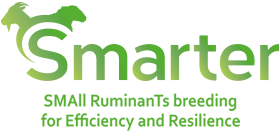
This project has received funding from the European Union’s Horizon 2020 research and innovation programme under grant agreement No 772787.
Expected Impact
SMARTER will produce modern and innovative production methods and technologies that will strengthen the sheep and goat sector’s competitiveness and its capability to offer products that correspond to consumer expectations and market demands.
SMARTER project will contribute at different levels:

- will propose breeding schemes adapted to the EU farming types (conventional, organic and agro-ecological) making it possible to breed and rear productive animals even in the harshest conditions.
- will allow farmers to use fewer food inputs (e.g. concentrate), to be more autonomous and less susceptible to variation in feed prices.
- will also offer sustainable solutions to selection organisations and farmers to tackle the problem of costly endemic disease. These solutions will come from identification and delivery of new gene mutations or estimated breeding values and genomic breeding values for economically-important health traits to breed more resistant and resilient livestock.
- will contribute to accelerate selection response using genomic selection in small ruminants, based on two main issues: the use of genomics to correct pedigree errors which are between 15 and 30% in extensively-managed sheep and goats and the increase of the reference populations from international collaboration.
- will evaluate the economic impact of genetic selection or crossbreeding strategies at the farm level. Economic impact will be evaluated considering an integrative strategy including genetic, chemical treatments, flock management, environmental and social constraints.
- will do a multi country evaluation to link available pedigree and/or genomic information at the European level. This evaluation will contribute to EU efforts to achieve competitiveness in the animal breeding sector and conserve breeds that are adapted to specific environments.
- will train and build capacity in academics, breeders and farmers using SMARTER technologies and strategies
Other environmental and social impacts
The outcomes of SMARTER will contribute to reducing the environmental impact of agro-ecosystems and to improving their benefits.
- SMARTER will provide tools to identify animals resilient to variable feed quality and quantity from marginal lands which are susceptible to climate change.
- SMARTER will develop methods and tools to select animals that use feed resources more efficiently. In cattle high efficiency ruminants also produce up to 25% less enteric methane than low efficient animals.
- Farm models developed in SMARTER will explore how breeding affects agro-ecological sustainability. This sustainability not only will include profit but also labour requirements, animal welfare, greenhouse gases and water availability. Thus, SMARTER will propose balanced social and environmentally friendly breeding goals.

